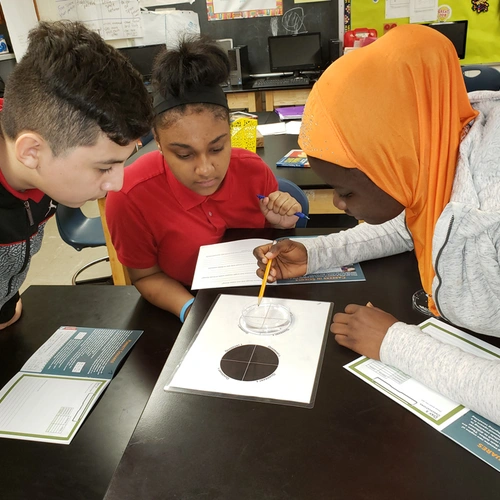Baltimore, MD—American Society for Cell Biology recognized Carnegie’s Steven Farber and the University of Pennsylvania’s Jamie Shuda with its Bruce Alberts Award for Excellence in Science Education, which honors “innovative and sustained contributions” to the field.
In 2002, Farber and Shuda co-founded BioEYES, a non-profit STEM education program that gives K-12 students hands-on experience studying the life cycle of zebrafish and lessons in fundamental genetic principles. Their efforts have reached more than 130,000 kids across the U.S. and abroad, with major hubs in Philadelphia, Baltimore, and Melbourne, Australia.
Farber and Shuda are passionate about training the next generation of diverse life science leaders. Since its inception, BioEYES has worked in partnership with teachers from largely under-resourced, inner-city schools to inspire young people using the power of live zebrafish.
Students use the fish to learn about genetics and the cardiovascular system. They also gain an understanding of the scientific method by asking questions and designing experiments to probe for answers.

“We created BioEYES to foster interest in and love for science in elementary, middle, and high school students and by serving largely inner-city communities. We also hope that this effort would ultimately expand the pipeline of diverse STEM leaders” said Farber. “Combined with my lab efforts, I describe myself as a ‘K-postdoc’ educator. It is incredibly gratifying to watch our work over the past 18 years bringing the excitement of science to so many young people and their families.”
In informing Farber and Shuda of the honor, the ASCB selection committee said they were “particularly impressed by your longstanding partnership and the influence that two individuals working together can have”. They also praised the pair for pursuing international partnerships and for publishing about the students' experiences, actions that the committee called “indicators of sustained and excellent contributions to science education."
Farber, a Carnegie staff scientist since 2004, uses zebrafish to investigate the processes by which lipids are modified and transported in the circulatory system. His findings not only explore how cells utilize and transport lipids needed for critical functions, but also enhance our ability to fight heart disease, obesity, and diabetes. He is also an adjunct professor in Biology at the Johns Hopkins University.
“By teaching young students, who often bring this knowledge home to their parents, and by training school science teachers on how professional scientists solve problems, BioEYES has promoted scientific literacy across multiple generations,” said Carnegie Embryology Director Yixian Zheng. “This work has tremendous societal value, whether or not the children go on to pursue STEM careers of their own. Congratulations to Steve and Jamie on this well-deserved recognition.”
